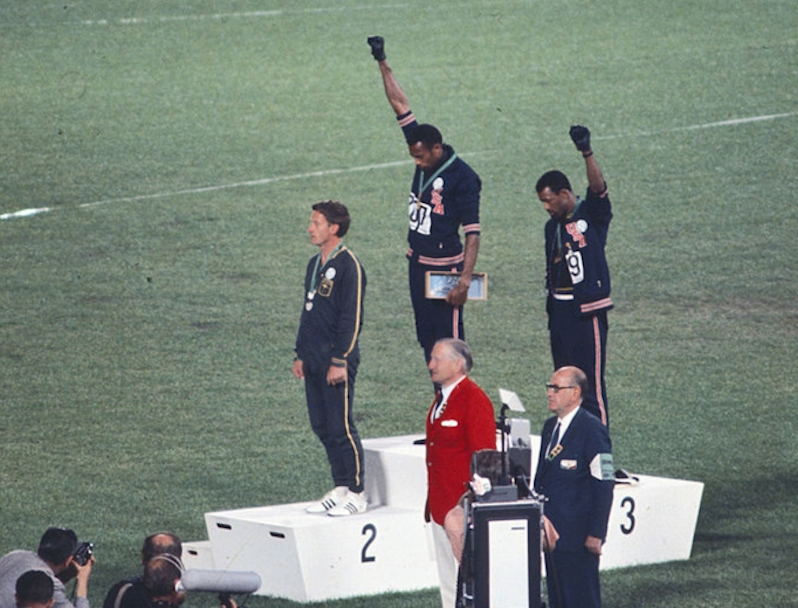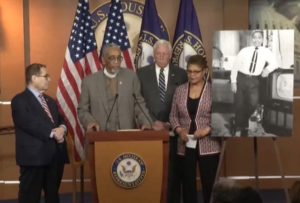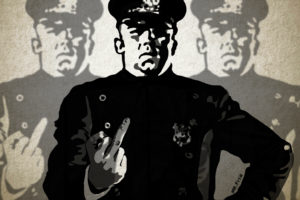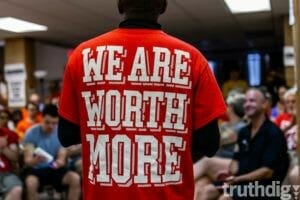1968 ‘Black Power Salute’ Sparked Ongoing Miscarriage of Justice by U.S. Olympic Committee
The silent gesture by medalists John Carlos and Tommie Smith was meant to raise awareness of human rights, not dishonor the flag. Both men deserve an apology for how they have been treated. From left on the 200-meter medal stand at the Mexico City Olympics: Australian Peter Norman and Americans Tommie Smith and John Carlos. (Angelo Cozzi / Wikimedia Commons)
1
2
From left on the 200-meter medal stand at the Mexico City Olympics: Australian Peter Norman and Americans Tommie Smith and John Carlos. (Angelo Cozzi / Wikimedia Commons)
1
2
Was there any precedent for what Smith and Carlos had done in Mexico City? In 1936, German athletes made the Nazi salute when awarded their medals. Brundage, at the time the president of the USOC, made no objection.
In the years after the Mexico City Olympics, both Smith and Carlos found life difficult. They had trouble finding work. In the late ’70s, Carlos’ wife committed suicide. He blamed the pressure put on him by his Olympic protest. He eventually became a track coach at Palm Springs High School. In 2011 he finally told his story in a book, “The John Carlos Story: The Sports Moment That Changed the World.”
Smith, fired from his job at North American Pontiac upon returning from Mexico City, became a track coach, taught sociology at Ohio’s Oberlin College, and was a faculty member at Santa Monica College. His book, “Silent Gesture,” was published in 2007. In 2008 he sent three-time gold-medal-winning track star Usain Bolt a meaningful birthday gift: one of the track shoes he wore in 1968.
In the 41 years since Brundage’s death in 1975, both Smith and Carlos say, they have never gotten so much as a feeler from either the IOC or USOC about reconciliation. Neither has been voted into the American group’s hall of fame, even though by Smith’s count he once held world records in 11 different events.
“I think their attitude is, ‘Why bring it up?’ ” Smith told me. “Why rock the boat now?” But if some conscientious official was looking to right a wrong that grows larger with each passing Olympics, would Smith be open to hearing them out? “I would,” he said, pausing, “take what they say into account. I would listen.”
It’s a shame, then, that as the opening ceremonies for the Summer Games in Rio unroll, Smith and Carlos still wait for an apology.
But this week their alma mater San Jose State University, though not the USOC, recognized their achievements. Both men were smiling as they returned there for a ceremony celebrating the reinstitution of the track program (discontinued 28 years ago), posing beside the statue of them that was erected on the campus in 2005.
The Mercury News caught the spirit of the event:
SUPPORT TRUTHDIG
San Jose State offered the nation a course of healing Monday. The timing couldn’t have been better. For the first time since 1960, when SJSU’s Smith and Carlos shook the world with their black-glove salute on the medal stand at the Summer Olympics, the university’s administration has formally embraced the two men. It is reinstating the track and field program that raised Smith, Carlos and many others to Olympic caliber. The celebration Monday [Aug. 1] evoked a new level of inclusion and understanding at the institution that, for nearly a half-century, seemed not to get it. For Smith and Carlos, this fulfills a lifelong hope that their silent protest be seen not as dishonoring the American flag but as they intended: to raise consciousness about basic human rights. They and many alumni saw dropping the track program in 1988 as an added insult. The inspiring statue of the men that stands on the campus today was conceived by students, who raised the money for it, not the university itself.It is time for the U.S. Olympic Committee to admit, finally, that Avery Brundage is no longer running the show. Your support matters…
Independent journalism is under threat and overshadowed by heavily funded mainstream media.
You can help level the playing field. Become a member.
Your tax-deductible contribution keeps us digging beneath the headlines to give you thought-provoking, investigative reporting and analysis that unearths what's really happening- without compromise.
Give today to support our courageous, independent journalists.






You need to be a supporter to comment.
There are currently no responses to this article.
Be the first to respond.